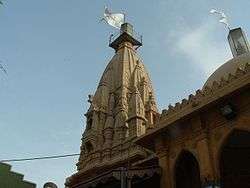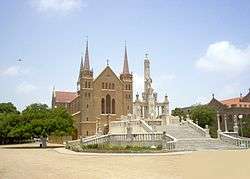Religion in Karachi
The Religions in Karachi includes Islam, Christianity, Hinduism, Sikhism, Buddhism, Zoroastrianism and others. According to a 1998 census of Pakistan, the religious breakdown of the city is as follows:[5] Muslim (96.45%), Christian (2.42%), Hindu (0.86%), Ahmadis (0.17%) and other (0.10%). Other religious groups include Parsis, Sikhs, Bahai, Jews and Buddhists. Of the Muslims, approximately 65% are Sunnis and 35% are Shi'ites. The Sunnis follow Hanafi fiqh while Shi'ites are predominantly Ithnā‘Ashariyyah fiqh, with significant minority groups who follow Ismaili Fiqh, which is composed of Nizari (Aga Khanis), Mustaali, Dawoodi Bohra and Sulaymani fiqhs. Karachi was a small fishing village of Muslim Sindhi and Balochi people when Hindu merchants established a trading port in early 18th century. The British seized control of the offshore and strategically located island of Manora in 1839, Karachi had about 10,000 inhabitants predominantly Muslim.[6] Thereafter, authorities of the British Raj embarked on a large-scale modernisation of the city in the 19th century with the intention of establishing a major and modern port which could serve as a gateway to Punjab, the western parts of British India, and Afghanistan. Britain's competition with imperial Russia during the Great Game also heightened the need for a modern port near Central Asia, and so Karachi prospered as a major centre of commerce and industry during the Raj, attracting communities of: Africans, Arabs, Armenians, Catholics from Goa, Jewish, Lebanese, Malays, Konkani people from Maharashtra, Kuchhi from Kuchh, Gujarat in India, and Zoroastrians[7] (also known as Parsees) - in addition to the large number of British businessmen and colonial administrators who established the city's poshest locales, such as Clifton. This mass migration changed the religious and cultural mosaic of Karachi.
The 104-year of British rule changed the demographic profile of Karachi from a Muslim town to a multicultural city. At the time of independence, nearly half the population of Karachi was non-Muslim. After the independence of Pakistan in 1947 saw the influx of Muslim refugees from India fleeing from anti-Muslim pograms. Majority of the Urdu speaking and other non-Punjabi Muslim refugees that fled from various states of India settled in Karachi giving Culture of Karachi a blend of South Asia and a predominantly Muslim city. Nearly all Hindus and Sikhs of Karachi migrated to India after 1947. The largest religious minority in Karachi are the Christians. The two major Christians ethnic groups are Goan Catholics and Punjabi Christians.[8] The Punjabi Christians are converts from the Hindu Churas and Mazhabi Sikh caste to Christianity during the British raj.[9]
The state Religion in Pakistan is Islam, which is practiced by about 96-98% of the 195,343,000[10][11] people of the nation.[12][13][14] The remaining 2-4% practice Hinduism, Christianity, Ahmadiyya in Pakistan, Sikhism in Pakistan, Buddhism in Pakistan, Bahá'í Faith in Pakistan and other religions.[14][15] Muslims are divided into two major sects: the majority of them practice Sunni Islam, while the Shias an estimated 30%.[12][14][15][16][17][18] Nearly all Pakistani Sunni Muslims belong to the Hanafi Fiqh Islamic law school.[14] The majority of Pakistani Shia Muslims belong to the Ithnā‘Ashariyyah Islamic law school, with significant minority groups who practice Ismailism, which is composed of Nizari (Aga Khanis), Mustaali, Dawoodi Bohra, Sulaymani, and others.

See also
References
- ↑ "Religions in Pakistan". CIA World Factbook. Retrieved 2013-07-09.
- ↑ Curtis, Lisa; Mullick, Haider (4 May 2009). "Reviving Pakistan's Pluralist Traditions to Fight Extremism". The Heritage Foundation. Retrieved 31 July 2011
- ↑ a b c "Religions: Islam 95%, other (includes Christian and Hindu, 2% Ahmadiyyah ) 5%". CIA. The World Factbook on Pakistan. 2010. Retrieved 2010-08-28.
- ↑
- ^ International Centre for Political Violence and Terrorism Research at Nanyang Technological University, Singapore: "Have Pakistanis Forgotten Their Sufi Traditions?" by Rohan Bedi April 2006
- ↑ Arif Hasan, Masooma Mohiburl (2009-02-01). "Urban Slums Reports: The case of Karachi, Pakistan" (PDF). Retrieved 2006-04-20.
- ↑ Karachi in 1889
- ↑ The Parsi Community in Karachi, Pakistan PRI's The World
- ↑ What was the past of Punjabi Christians?
- ↑ Alter, J.P and J. Alter (1986) In the Doab and Rohilkhand: north Indian Christianity, 1815-1915. I.S.P.C.K publishing p196
- ↑ 2014 World Population Data
- ↑ Information on other countries: http://hdr.undp.org/en/media/HDR_20072008_EN_Complete.pdf
- 1 2 "Country Profile: Pakistan" (PDF). Library of Congress Country Studies on Pakistan. Library of Congress. February 2005. Retrieved 2010-09-01.
Religion: The overwhelming majority of the population (96.3 percent) is Muslim, of whom approximately 70 percent are Sunni and 30 percent Shia.
- ↑ "Population: 174,578,558 (July 2010 est.)". Central Intelligence Agency. The World Factbook on Pakistan. Retrieved 2010-08-28.
- 1 2 3 4 "Pakistan, Islam in". Oxford Centre for Islamic Studies. Oxford University Press. Retrieved 2010-08-29.
Approximately 97 percent of Pakistanis are Muslim. The majority are Sunnis following the Hanafi school of Islamic law. Between 25-30 percent are Shiis, mostly Twelvers.
- 1 2 "Religions". CIA. The World Factbook on Pakistan. 2010. Retrieved 2010-08-28.
- ↑ "Mapping the Global Muslim Population: A Report on the Size and Distribution of the World's Muslim Population". Pew Research Center. October 7, 2009. Retrieved 2010-08-28.
- ↑ Miller, Tracy, ed. (October 2009). Mapping the Global Muslim Population: A Report on the Size and Distribution of the World's Muslim Population (PDF). Pew Research Center. Retrieved 2010-08-28.
- ↑ "Pakistan - International Religious Freedom Report 2008". United States Department of State. Retrieved 2010-08-28.
